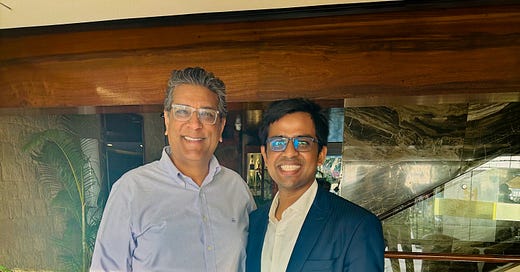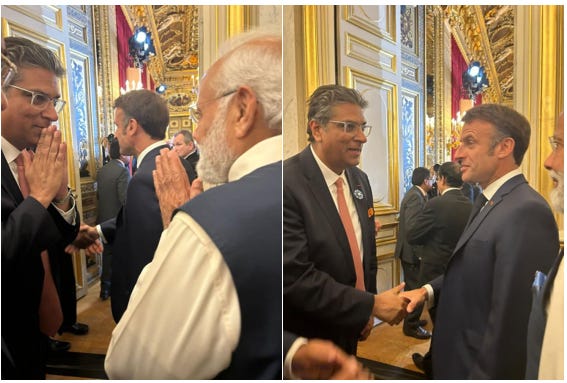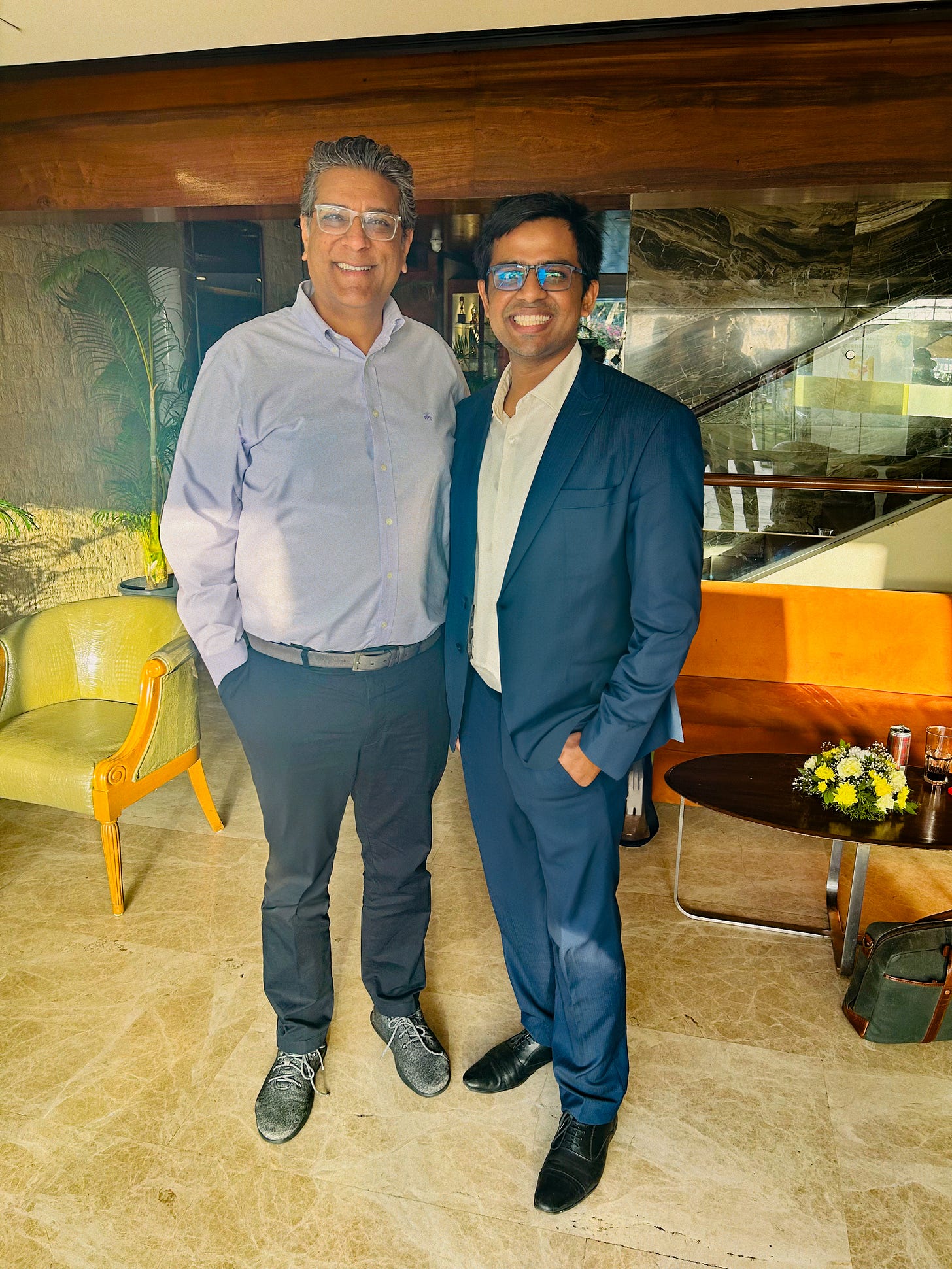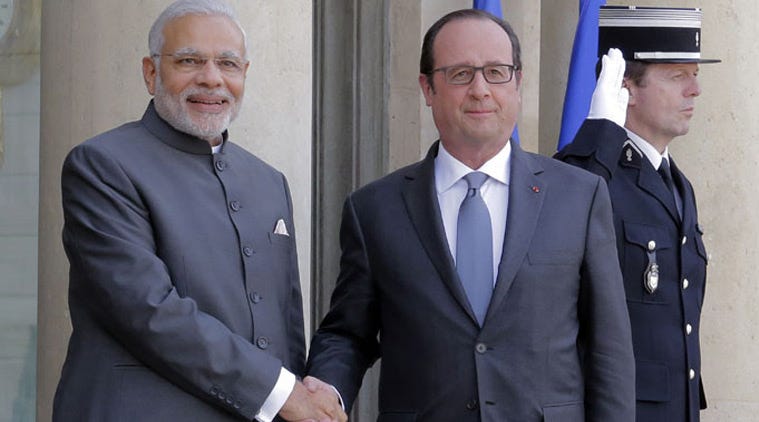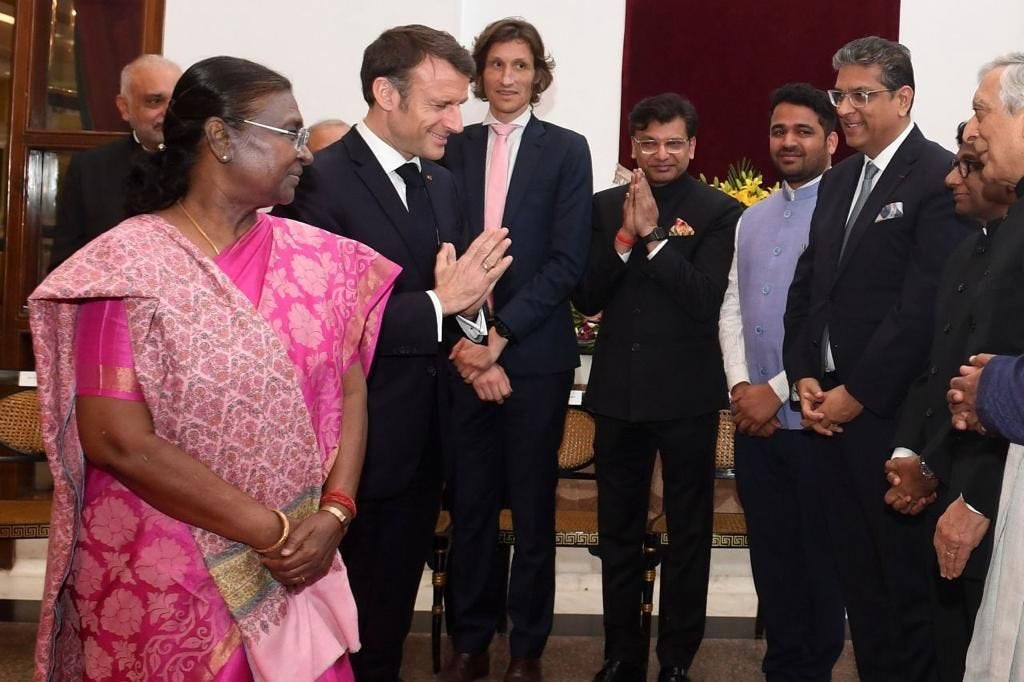07: Insights into Indo-French Trade Dynamics from the Former IFCCI President, Sumeet Anand
Exclusive insights from France's highest civilian award winner, Mr. Sumeet Anand!
Bonjour Kula Readers 👋
In this edition, we bring you an exclusive interview with Sumeet Anand, the former president of Indo-French Chamber of Commerce & Industry (IFCCI). Through his extensive experience and close involvement with top management, Sumeet sheds light on the transformation of India's global perception and the flourishing trade relations between India and France over the past decade.
What has changed for India in 2014 vs in 2024? How have the trade relations between India and France evolved over the past decade? What challenges do European businesses face when they aim to expand in India?
Thanks to IFCCI presidency and his closely experience with top management Sumeet expands our wisdom by diving deep into the India’s evolution in global scenario.
Key Takeaways 🔎
🚀 India's Transformation: From 2014 to 2024, India’s FDI doubled to $83bn. The key catalysts are the election of a strong government headed by PM Modi, reformative changes (GST), and a proactive dialogue with international leaders.
⚡ Indo-French trade evolution for CAC 40 companies: Indio-French trade has doubled from €6.8bn in 2013 to €13.4bn in 2023 due to huge domestic demand, ability to procure locally, availability of human labor and strategic partnerships (space, defense, and sustainability…)
💡 Challenges and Opportunities for SMEs: To push the number of French SMEs in India from 70, it is necessary to develop enables to handle logistical challenges and regulatory compliance. The future relies on enhanced collaboration and capacity-building initiatives particularly tailored to the needs of SMEs.
Who is Sumeet Anand?
Sumeet Anand embarked on his European odyssey in the early 1990s. After graduating from HEC Paris in 1994, Sumeet gained industrial exposure for 15 years for Pernod Ricard, Dabon - Savencia and Arjowiggins.
⛳ In 2012, Sumeet founded IndSight a premier strategy consulting firm specializing in guiding Fortune 500 global corporations on establishing successful ventures in India. Today, IndSight boasts a global presence across North America, Europe, and Asia, showcasing Sumeet's visionary leadership and strategic acumen.
🤝 Sumeet is also an Operating Partner at the leading European VC fund, C4 Ventures.
🎯 Sumeet's commitment to fostering Indo-French economic ties is exemplified by his tenure as President of the Indo-French Chamber of Commerce & Industry (IFCCI) from 2019 to 2023. Sumeet is a co-founder of the France India Foundation. His leadership as the former President of the HEC Paris India Alumni Group underscore his dedication to nurturing educational and professional networks.
🥇In Nov 2022, for his contributions to the fields of business, industry, and education in the context of Indo-French relations, he was bestowed with the prestigious French decoration of the Chevalier de la Legion d`Honneur/ Knight of the Legion of Honour by Emmanuel Lenain, Ambassador of France to India.
Long story short, Sumeet's journey is a testament to the transformative power of collaboration, innovation, and cross-cultural exchange. His visionary leadership continues to inspire and shape the future of Indo-French cooperation on both business and academic fronts.
How did we meet Sumeet?
The tale of how I, Onkar Kharadkar crossed paths with Sumeet Anand is driven by a shared passion for fostering Indo-French trade relations.
🤔 Why ? As a native Indian hailing from a middle-class background, my upbringing was intertwined with the presence of iconic French brands in everyday Indian households. From L'Oréal products adorning my mother's vanity to other French commodities gracing local markets, I was intrigued by the widespread influence of these brands in India. This curiosity sparked a desire to delve deeper into the mechanisms driving the success of French businesses in India. I decided to actively follow this ecosystem to discover the key actors.
🤓 In my quest for my answers, I stumbled upon the Indo-French Chamber of Commerce & Industry a pivotal organization facilitating the establishment and growth of international French brands in India. Intrigued by the pivotal role played by associations like IFCCI in bridging cultural and commercial divides, My interest piqued further upon discovering a post by Sumeet Anand commemorating the 45th special anniversary Annual General Meeting of IFCCI.
🙌🏻Inspired by Sumeet's exemplary achievements and unwavering commitment to fostering Indo-French ties, I embarked on a journey of discovery, tracing Sumeet's impactful contributions over the past two years. From his notable association with IFCCI to his illustrious career trajectory, I was captivated by Sumeet's unwavering dedication to promoting cross-border collaboration and economic synergy between India and France.
⏳Fast forward to 2024, when we started Kula Connect, an opportune moment rose to connect with Sumeet! After mentioning Kula Connect, and sharing a relatable alma mater at a French Grande école and similar work tracectory at French multinational, Sumeet graciously accepted my invitation, paving the way for a meaningful exchange of ideas and insights.
💡 A great mind with clear thoughts, long international vision and aspiration to make India proud is how I can summarise our hour of discussion. We also had lighter chats over HEC vs ESCP, and how he still loves strolling through courtyards of Louvre till Hôtel de Ville in Paris.
Sumeet’s Interview 🎤
🏆In 2014, Sumeet was elected as Member of the Governing Council of IFCCI, so he was now in position to closely observe the Indo-French trade grow and groom.
As Sumeet mentions,”The situation in India was quite different back in 2014. There was an evident reluctance from foreign investors with their decision to make huge investment in India. Investors were afraid to set a foot in India mainly due to poor understanding of the Indian market and existence of lack of knowledge which acted an evident barrier to obstruct free flow of trade and business.“
🌎 In 2014, Business standard mentioned, “Foreign retailers may not enter India before 2014 elections because there were a lot of concerns for the businesses and not a clarity on how will the government address these concerns. There were a lot of contentious conditions in the multi-brand retail policy, including 30% sourcing from small firms, 50% investment in infrastructure and access only to cities with over one million population. The confusions coupled with political uncertainty delayed significantly the entry and interest of global giants.”
Sumeet adds, “France was also on backfoot when it came to making investments and building business in India. The main reason was there were very few sucess stories both financial and commercial which came to limelight and captured the attention of big business corporates. The deals that make the headlines were primarily driven and guaranteed by the government involving fighter jets and nuclear power plants, driving only a few businesses at the epoke. “
🛦 As per the local , the main aim for French President Francois Hollande’s visit to India was “to clinch a $12-billion sale of Rafale fighter jets” as a similar $9.3-bn agreement was signed during a visit to India in 2010 by Hollande's predecessor, Nicolas Sarkozy.
👎 As per the Times of India, “Three main reasons why there was no deal signed Hollande visit to India: Firstly, complex nature of high technology projects involed in the defense sector; Secondly: unlike Nicolas Sarkozy, Hollande was more of facilitator and less of a salesman for French businesses; Thirdly: Hollande emphasised on the big picture to develop strategic and political ties with India.”
All of this changed in 2014:
Radical change in Indian governance: The Modi Sarkar
Sumeet continues, “Immediately after the finalization of the new government in 2014, the changes in India were visible. There are various milestones achieved during the tenure of the Modi government, which witnessed the changes thereby driving a strong momentum of international trade and business.”
In 2015, first full bilteral visit to France: As soon as his election, Modi embarked on the revitalisation of India-EU relations by visiting Europe.
💪 As per the ministry of external affairs, “Indo-French relations received a boost in 2015 with high level engagements and expansion of the already strong cooperation. In 2015, Shri Narendra Modi visited France in April. This was the first full bilateral visit to France in 9 years. 19 MoUs were signed during the visit encompassing diverse areas of cooperation between India and France, from Nuclear Energy, Space, Railways to Sports, Tourism and the Twinning of historical monuments.”
🧐 Similarly in a report published by European Parliament, “Indian perception about European countries changed after PM Modi’s visit to France and Germany in April 2015. It appears that economic issues are going to dominate Prime Minister Modi’s foreign policy vision.”
Sumeet highlights, “Other key catalysts for making India an attractive destination for FDI is implementation of GST.”
🛒In 2017, Introduction of GST: Modi government introduced The Goods and Services Tax (GST) thereby enabling a single market for India's 1.3 bn strong population.
GST, or Goods and Services Tax, is a single tax system introduced in India to replace multiple indirect taxes like sales tax, VAT, etc. It applies to the sale of goods and services throughout the country. It's like a one-stop tax for all goods and services, making tax administration easier for both businesses and the government.
As per the ET, “One of the key reasons to implement GST was to attract more foreign direct investments across sectors due to tax transparency and ease of doing business.”
Further as per the ET, “GST has had a positive impact on the manufacturing sector by removing the cascading effect of taxes resulting in the reduction of manufacturing costs coupled with ease in undertaking compliances because of the automation of tax compliances”
✅ So in 2022, a reality check: The result is clear, doubling of Foreign Direct Investments (FDI) in last 8 years due to proactive support of Indian government, reduced bureaucracy and “Make in India” making India independent.
Make in India is an initiative launched by the Government of India to encourage domestic manufacturing and boost the country's industrial sector. It aims to attract foreign investment, promote innovation, and create job opportunities within India.
As per the Ministry of Commerce & Industry, “Make in India’ completes 8 years, annual FDI doubles to $83 bn. To attract foreign investments, the Government of India has put in place a liberal and transparent policy wherein most sectors are open to FDI under the automatic route. FDI inflows in India stood at $45bn in 2014-2015 and have since consecutively reached record FDI inflows for eight years. The year 2021-22 recorded the highest-ever FDI at $83bn. This FDI has come from 101 countries and invested across 31 UTs and States and 57 sectors in the country. On the back of economic reforms and Ease of Doing Business in recent years, India is on track to attract $100bn FDI in the current FY.”
Now, to explore and understand how French companies make their strategies, it is crucial to have a general understanding of top companies in France
Understanding the CAC 40 Companies and their priorities
CAC 40 is a benchmark French stock market index that represents the 40 largest publicly traded companies listed on the Euronext Paris stock exchange. These companies are considered to be the most significant and influential in the French economy. Some well-known companies include Total Energies, L'Oréal, Saint-Gobain, LVMH Moët Hennessy Louis Vuitton, and Airbus Group.
Sumeet simplifies the approach to the Top 40 companies by dividing them into four broad categories:
😎 Lifestyle companies: Companies providing Luxury products, Wine & Spirits, Food & Beverages and Leisure goods (LVMH, Pernod Ricard…). Lifestyle companies mainly offer premium products and hence naturally the customers are people with high purchasing power
🏭 Industrial Companies: Companies providing goods for the masses (Saint-Gobain, Schneider Electric, …). These companies provide affordable and quality solutions to solutions to masses, hence key enablers are population and local demand
💻Tech companies: Companies catering to Software & Computer services (Capgemini, Dassualt, …)
👨🏻💼Services and other companies: Banking, Insurance, and all other companies can be clubbed in this category. These companies act as supporting pillars to ensure smooth cross-border businesses and depend primarily on human labor”
As per the Embassy of India in France, ”39 of the 40 CAC 40 (French Stock Market Index) companies are present in India”
Sumeet links the French business to India by highlighting four key aspirations :
Huge Domestic demand, Ability to procure locally, Availability of human labor, and Expertise in strategic topics (space, defense, and sustainability…)
🤑Market with a huge demand: The 1.4bn population is itself a big source of demand for the products. This naturally adds up to demand for the affordable products furnished by key Industrial companies as well as premium products. LVMH reported sales of €80m in India in 2023, while Saint Gobain reported sales of €1.2bn in India in 2022.
👨🏻💼👩🏻💼Big Workforce: As per an article, “India is the world's second-largest workforce, with over 500 million people in the labor force. India is the world's leading destination for outsourcing and offshoring, with over 60% of the global market share.” Leading French multinationals have successfully employed numerous India: BNP Paribas 14k employees, Capgemini 175k employees, Renault 16k employees…. Yes, it is a huge success!
📍 Local Procurement challenges: The supply chain is a key issue that needs to be addressed for some of the companies to succeed. Automotive companies like Renault and Pharma companies are highly dependent on the local supply to drive their sales and growth. As sighted in the mobility outlook, “Industry volumes for Renault are increasing every month and we need to keep up with that pace while managing the supply chain issue.” Outbound logistics is one of the challenges for lack of success.
🚀 Strategic partnerships: Historically the Indo-French strategic partnership was built to develop and support India in the Defense and Space sector. The relations have strengthened over some time and are expected to get stronger further. As per Reuters, “In 2024, India and France have agreed to work together on the joint production of defense equipment including helicopters and submarines for the Indian armed forces and production for friendly countries. After Russia, France is the largest arms supplier to India, which has relied on its fighter jets for four decades.”
Indo-French Partnership for SMEs: Beyond the CAC 40 Companies
Sumeet emphasizes, “As we delve deeper into the Indo-French partnership, it's essential to shift our focus from the prominent players represented by the CAC 40 companies to the often overlooked yet crucial segment of Small and Medium Enterprises (SMEs). These smaller entities, though less conspicuous, play a significant role in shaping bilateral trade relations between India and France.”
🏛️ Historically, SMEs were less talked of due to focus on big business where Government was a key Enabler:
Traditionally, government support has been instrumental in facilitating Indo-French collaboration, particularly in sectors such as defense, civil aviation, railways, and infrastructure projects. Initiatives like joint defense production agreements and strategic alliances in civil aviation have laid a robust foundation for bilateral cooperation. Hence only few SMEs very involved in trade who were part of value chain of these key big businesses.
📈 Expanding Scope for Business:
With increasing confidence and trust between India and France, there's a growing opportunity for businesses of all sizes to engage in bilateral trade. SMEs are now finding avenues to enter international markets. SMEs are expanding their horizons and venturing into global business landscapes, driven by the momentum created by established players.
💸 Challenges and Opportunities for SMEs:
SMEs face a myriad of challenges as they navigate the complexities of international trade. From logistical hurdles to regulatory compliance issues, these smaller enterprises must overcome various obstacles to seize opportunities in the Indo-French partnership. Additionally, limited resources and expertise pose significant challenges for SMEs looking to expand their footprint beyond domestic markets.
The Way Ahead:
Sumeet enlightens “Looking ahead, the evolution of the Indo-French partnership hinges on the collective efforts of both governments and businesses, including SMEs. As bilateral relations continue to strengthen, there's a need for enhanced collaboration, knowledge sharing, and capacity building initiatives tailored to the needs of SMEs. Streamlining regulatory processes, providing access to financing options, and fostering innovation ecosystems are essential steps in empowering SMEs to thrive in the Indo-French business landscape.”
Sumeet concludes, “While the focus often remains on large corporations represented by the CAC 40 companies, the role of SMEs in driving bilateral trade relations between India and France cannot be understated. By addressing challenges and leveraging opportunities, SMEs stand poised to contribute significantly to the continued growth and evolution of the Indo-French partnership.”

